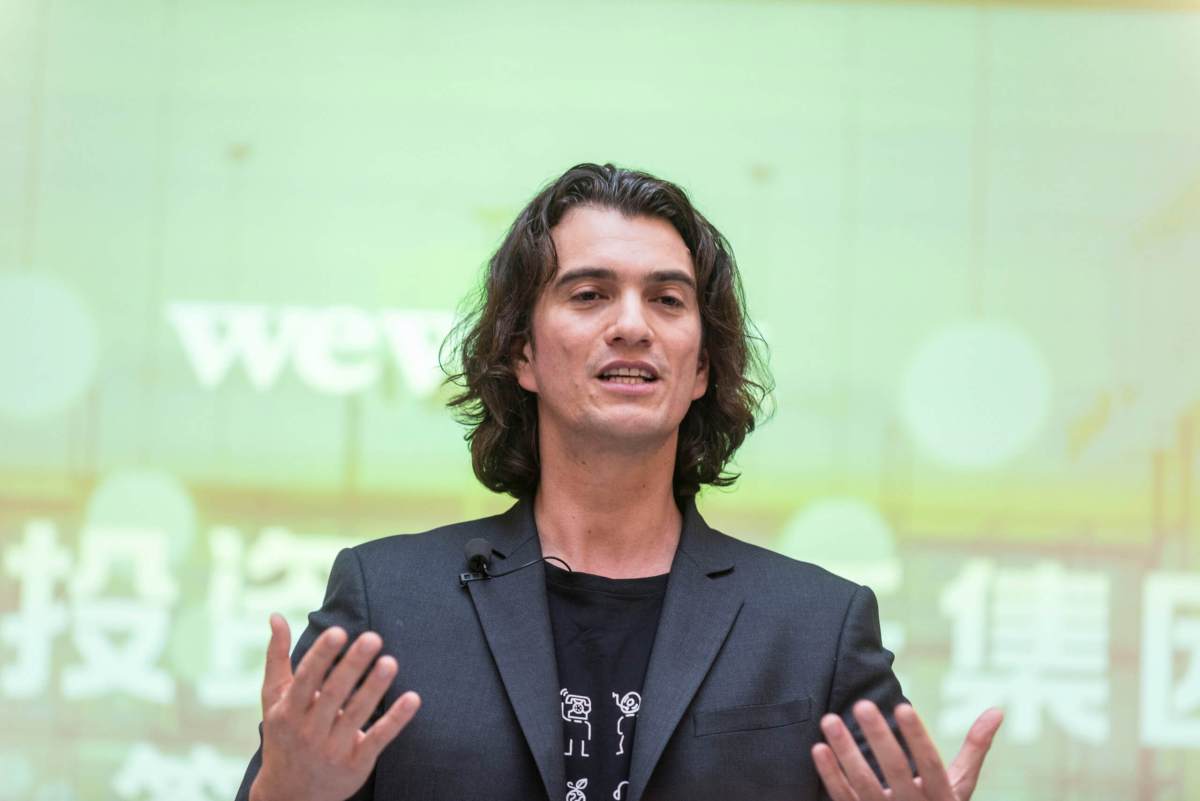By Joshua Franklin, Herbert Lash and Anirban Sen
(Reuters) – As WeWork parent We Company’s CEO Adam Neumann asked Artie Minson and Sebastian Gunningham to separately take care of the U.S. office-sharing space start-up’s finances and business, they developed turfs that became their mutual ticket to the top job.
We Company’s board decided to split the CEO job when it announced on Tuesday that Neumann would relinquish his role and only stay on as non-executive chairman, following a plunge in the company’s estimated valuation and a fallout with investors, including Japan’s SoftBank Group Corp <9984.T>.
Minson, previously chief financial officer, and Gunningham, previously vice-chairman, were named co-chief executive officers. Minson, a former chief financial officer of Time Warner Cable Enterprises LLC who joined We Company in 2015, will oversee its finance, legal, human resources, real estate and public communications. Gunningham, a former executive at Amazon.com Inc
While these responsibilities are in line with Minson and Gunningham’s previous roles, Neumann’s absence will allow them to carry them out unimpeded. This is because the 40-year-old co-founder of We Company requested most decisions, no matter how small, to go through him, even though he often did not have the bandwidth to deal with them, according to five current and former We Company employees, who spoke on condition of anonymity.
When Neumann made decisions, they often came at breakneck speed. One former employee said that staff reorganizations were so frequent, he checked the company’s internal organizational chart every day, fretting over any potential changes to his role.
A We Company spokesman declined to comment. Neumann did not respond to requests for comment.
Gunningham, 57, joined We Company last year with an aim to change much of this, after spending 11 years at Amazon as a member of its executive leadership team, reporting directly to CEO Jeff Bezos. By reporting directly to Neumann, Gunningham hoped to bring some order and balance to his new boss’s freewheeling, unstructured management style, the employees who have worked with Gunningham said.
While Gunningham was unable to fully rein in Neumann, he played an important role in organizing We Company’s operations, to the extent some employees said they referred to him as “shadow CEO” and “the adult in the room”. One of them quipped that Gunningham was the most important We Company executive not to be mentioned in its initial public offering (IPO) prospectus, when it was first published last month. An updated version of the prospectus included him.
Gunningham did not respond to a request for comment.
Gunningham visited WeWork locations worldwide and carried out performance audits, according to the current and former employees. He introduced company-wide performance targets, overriding team-based goals that were set inconsistently, they said.
While Neumann focused on being a salesman for We Company that attracts prospective investors and new clients, as well as a cheerleader for company employees, Gunningham was globe-trotting We Company’s offices searching for efficiencies. In one instance, Gunningham took it upon himself to fix the printers in some WeWork locations, one former employee said.
To be sure, these efforts have not had a big impact on the company’s bottom line. Its losses have been widening as it spends more on new leases to expand its locations and fund its rapid revenue growth.
COMMUNITY ADJUSTED
Keeping the books was Minson, 48, who has served as chief financial officer since 2016 after joining We Company as president in 2015. Neumann trusted him as someone who understood all aspects of We Company’s business and helped bankroll its expansion, according to the sources.
One of Minson’s main attractions to Neumann was his ability to present We Company’s earnings in a positive light, leading to frothy valuations, the sources said. For example, Minson helped create the term “community-adjusted” earnings, a non-standard metric that flattered the company’s numbers by excluding rent and tenancy expenses. The metric was excluded from the company’s IPO prospectus.
He was also a proponent of We Company going public sooner, according a person familiar with the matter, and disagreed with Neumann about certain parts of the company’s first IPO filing, which attracted criticism from corporate governance experts.
Minson referred Reuters to a We Company spokesman for comment.
The biggest challenge the co-CEOs now face is putting the company on a path to profitability that will allow it to launch an IPO.
We Company postponed its IPO last week following push-back from prospective stock market investors, not just over its widening losses, but also over Neumann’s unusually firm grip on the company.
“While we anticipate difficult decisions ahead, each decision will be made with rigorous analysis, always bearing in mind the company’s long-term interests and health,” Minson and Gunningham wrote in an internal memo to staff on Tuesday that was seen by Reuters.
(Reporting by Joshua Franklin and Herbert Lash in New York and Anirban Sen in Bengaluru; Editing by Greg Roumeliotis and Christopher Cushing)


















